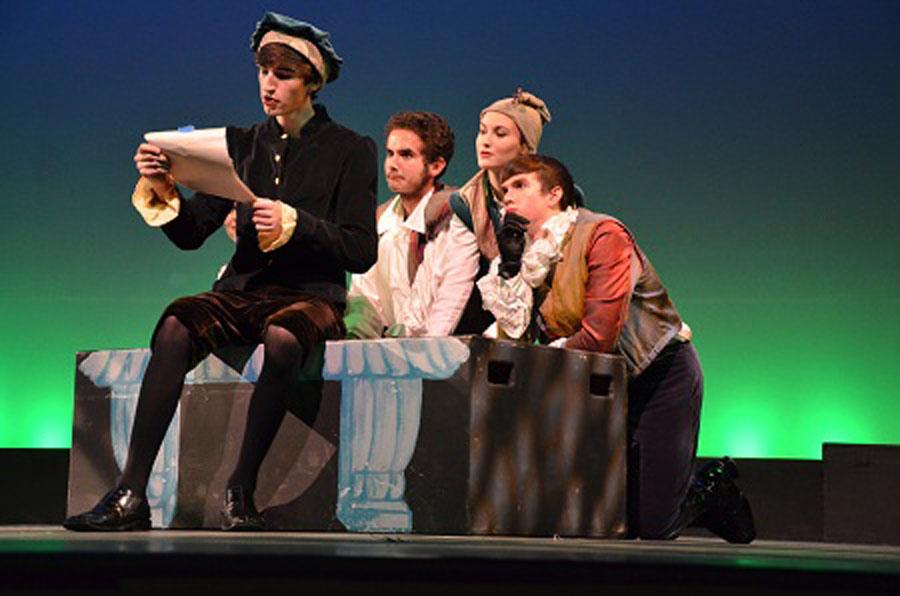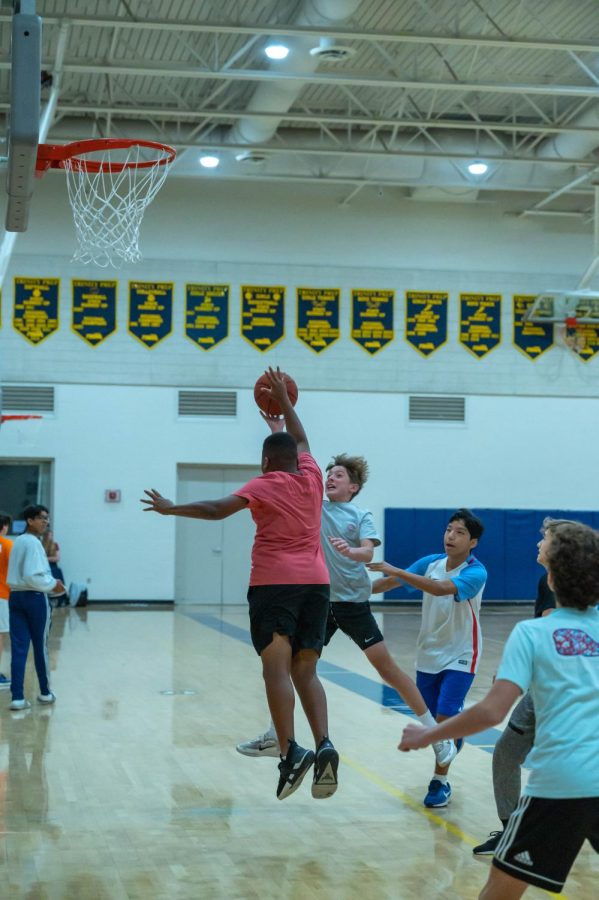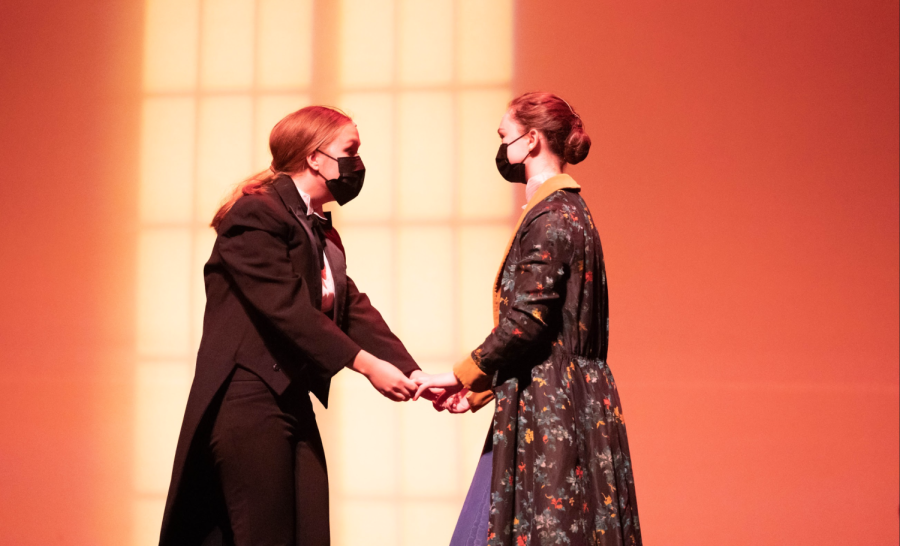Two Shakespeare plays in one night. Can it get any better? The theater productions of Much Ado About Nothing and Twelfth Night that were shown the weekend of October 18 delighted audiences with humor, wit, irony, and satire.
The theater department has not performed a Shakespearean play since 2008 when it performed Hamlet. Having a particular affinity for Shakespeare, director Donna Walker was excited about the idea of doing two Shakespearean plays in two acts.
“Originally I was just going to do Twelfth Night, but then we had a ton of people sign up and I hate having to turn away more people than I get to cast,” said Walker. “So I started kicking around how I could do this. I was like, ‘Well I could do two Shakespeares, one in the fall, one in the spring, or I could do two shortened versions, both on the same night.’ I chose the second and that way I could accommodate more people.”
Much Ado About Nothing is about two pairs of lovers, Benedick (sophomore Kiko Illagan) and Beatrice (senior Dana Kruger), and Claudio (senior Chase Everett) and Hero (senior Katy Sullivan).Benedick and Beatrice are engaged in a merry war, proclaiming their scorn for love, marriage, and each other, while Claudio and Hero are rendered practically speechless by their love for one another. Benedick and Beatrice are tricked by their friends Don Pedro (sophomore Joshua Khahky) and Leanato (senior Austin Sultzbach) into confessing their love for one another, while the villain of the play, Don John (junior Marc Lacognata), tricks Claudio into thinking that Hero cheated on him. Eventually, Dogberry (freshman Maria Camasmie), the local constable, discovers the trickery of Don John, and Claudio and Hero are reunited. At the end, the town celebrates the marriages of the two couples.
Twelfth Night is about a young woman named Viola (sophomore Joy Harlynking) who is shipwrecked on the coast of Illyria, an ancient region on the coast of the Adriatic Sea, and is helped ashore by a captain. She believes her twin brother, Sebastian (freshman Nicholas Reifler), to be dead. Disguising herself as a young man named Caesario, she searches for a job and is accepted as a servant under the Duke Orsino (freshman Jake McGarey). The Duke uses Caesario as a messenger to profess his love for Olivia (junior Simi Singh), a wealthy and noble lady who is in mourning over her dead brother. However, Olivia, believing Viola to be a man, falls in love with Caesario, while Viola falls in love with the Duke. In a comic subplot, after Olivia’s steward Malvolio (sophomore Thomas Kilger) chastises them for drinking, Olivia’s uncle Sir Toby Belch (senior Austin Sultzbach), Sir Toby’s friend Sir Andrew Aguecheek (senior Chase Everett), and Olivia’s servant Maria (junior Gaby Bloom) conspire to make Malvolio believe that Olivia has fallen for him. However, at the end, Malvolio finds out and plans to take revenge, while the love triangle is settled with Sebastian’s appearance on the scene, concluding in the marriages of the Duke and Viola, and Olivia and Sebastian.
The play, which started with Much Ado About Nothing, began with the scene of the return of the soldiers Don Pedro, Benedick, and Claudio from a war. Beatrice comes onto the scene, and the quarreling between Benedick and Beatrice is resumes. Sophomore Kiko Illagan and senior Dana Kruger effectively conveyed their “hatred” for each other’s characters throughout the beginning of the play by carrying on witty arguments which were enhanced by the various emotions in their voices, and which elicited laughter from the audience.
“Benedick and Beatrice refuse; they’re saying ‘Oh no, we’ll never get married, I don’t believe in love,’ but in reality they are teasing each other the whole show using their wit and using their language against each other and its really funny,” said Kruger.
In the play, Don John, the villain, is characterized as reticent in public, but evil in private. Marc Lacognata effectively portrayed this outwardly taciturn and inwardly wicked character.
“At first I auditioned with something totally different from what we did in the show,” said Lacognata. “First I tried making Don John Hispanic and it wasn’t really rejected, but it just didn’t fit the plotline because my brother Don Pedro would have had to be Hispanic and that would have just caused trouble. But coming together with how I played it, I modeled my character somewhat off of Keanu Reeves (Don John) in the movie. But in the movie, Don John is more awkward, whereas Don John in the play has more power and control.”
At a masquerade ball where Don Pedro woos Hero for Claudio, the various dances that the cast performed were creative and funny.
“The day I taught the kids the dance was a riot,” said Walker. “I told the students I wanted this process to be collaborative, and if they thought of funny bits of physical comedy they wanted to add, they should share their ideas. And they delivered.”
One of the dances they performed was from Michael Jackson’s Thriller. As unrelated as Michael Jackson is to William Shakespeare, Walker nevertheless encouraged the students to perform this dance, as well as other funny dances the students came up with.
About midway through the first act, two parallel scenes occurred. The first involved Leonato, Don Pedro, and Claudio sitting on a bench talking about Benedick and Beatrice, while Benedick eavesdrops from behind a tree. The second involved Hero and Ursula (junior Molly Wuerz), Hero’s attendant, sitting and talking about the same subject, while Beatrice eavesdrops from behind a tree. The comedy of both scenes was enhanced by physical techniques, which included crossing legs and moving simultaneously. The dramatic irony employed in both scenes also made the scenes more enjoyable.
Dogberry, the constable played by Maria Camasmie, may not have seemed to have an important role in the play, but her character was hilarious. In one scene, she repeatedly went on and off stage to scold the sleepy watchmen who were in charge of arresting Don John and his accomplices (played by freshmen Jacob Halladay-Glynn and Corey Myers).
In the scene when Don John’s accomplices are tried in court, one of them calls her an “ass,” and she plays along with that word throughout the rest of the play, telling other characters that she was called an “ass.” Her accent, pomposity, and the constant use of malapropisms especially evoked laughter from the audience.
One aspect of the play that could have been improved upon was the enthusiasm of the dancers at the masquerade ball. The dancers looked somewhat bored.
Twelfth Night
began with the entrance of Duke Orsino, his servants, and Viola. Duke Orsino is first portrayed as arrogant and questions Ceasario’s (Viola’s) ability as a servant.
When asked whether it was hard to perfect the snobby role of Duke Orsino, McGarey stated that it was not because he had previous experience.
“It wasn’t hard because that is something I’ve done before,” he said. “When I was in Candide, I was the understudy for Maximilian, and he was very devoted to his own person, so that was easy to relate to.”
The scenes that involved Duke Orsino, Viola, and Olivia lagged a little at first, but later became more interesting with the onset of Olivia’s love for Caesario, who is actually a girl. The dramatic irony in the scenes with Olivia and Caesario left the audience in suspense with the desire to know when Olivia would find out that Caesario was actually Viola.
In the comic subplot, Sir Toby and Sir Andrew Aguecheek are introduced as drunken fools, and the interactions between them provide comic relief for the audience. Austin Sultzbach and Chase Everett accurately portrayed these rowdy characters, and their actions drew many laughs from the audience.
Both characters engage in revelry. In one scene, they are so drunk that they summon the clown of the house Feste, played by freshman Madeline Walker, to sing for them. Feste and Sir Toby end up clowning around and knocking each other down. On a side note, Walker’s singing was excellent and skillful; during the drunken scene, she sang several different notes continuously in a solo and at several points in the show she performed short renditions of “Just Dance” by Lady Gaga, “Raise Your Glass” by Pink, and “Dude (Looks Like a Lady)” by Aerosmith.
When asked how he had prepared for the role of Sir Toby, Sultzbach stated that he had to learn the way drunk people behave.
“I literally had to look up drunk people on Youtube and just watch how they walk and how they talk and just really channel my inner comedy and my inner stupid person, which really was not that hard to do,” said Sultzbach.
The comedy associated with Sir Andrew is enhanced by his pathetic situation—he is so gullible that he does not even realize his huge salary is slowly being pilfered by the greedy Sir Toby. Also, believe it or not, Sir Andrew attempts to court Olivia, but is rejected by Olivia, who favors the dashing Caesario, prompting him to challenge Caesario to a duel. Sir Andrew, who believes himself to be a great swordsman, ineptly fights Caesario. Everett effectively played this hilarious character and mastered the humor associated with his character.
Malvolio, Olivia’s steward played by Thomas Kilger, is a funny character who can be defined as a kind of Puritan. He despises the rowdy behavior of Sir Toby and Sir Andrew and constantly chastises them.
The way Malvolio walked, by lifting his legs high above the ground, and the trick played by Sir Toby and others on him drew many laughs.
Although they did not play very humorous characters, Harlynking and Singh effectively portrayed Viola and Olivia, and their acting was solid.
One aspect of the play that could have been improved upon was the volume of the actors’ and actresses’ voices. Sometimes, it was difficult to hear some of the characters speak, and they sometimes trailed off at the end of sentences.
Overall, the theater department did a great job performing Shakespeare and it was able to respect and upkeep the integrity of both scripts even though both were cut down extensively.
It is evident that Walker and the actors and actresses worked very hard, and they should be proud of themselves.























